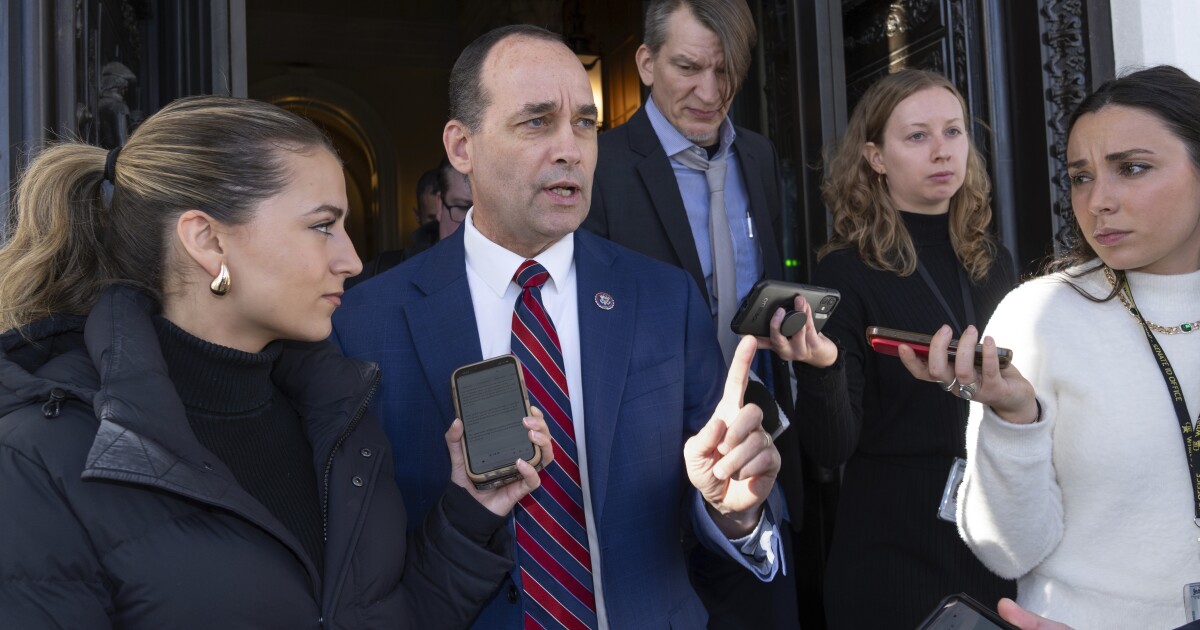

Members of the conservative House Freedom Caucus are warning their Republican leaders to avoid making “shady side deals” with their Democratic counterparts to come to a spending agreement, instead urging leadership to push for increased budget cuts.
In a position released on Friday, the Freedom Caucus said the House GOP must use its position to reduce spending levels across the board and keep the government budget’s top-line number at or below the $1.59 trillion mark that was negotiated between the White House and Congress earlier this year.
LAUREN BOEBERT’S DISTRICT SWAP IS GIFT TO GOP, BUT REELECTION OBSTACLES REMAIN
“As Congress negotiates FY 2024 government funding, Republicans must truly reduce programmatic spending year-over-year from the enacted FY 2023 level, and end the use of disingenuous gimmicks to conceal from Americans the real spending harm being perpetrated by their elected representatives,” the caucus wrote. “Anything less represents more failure and suffering for the American people.”
The caucus expressed concerns about a possible “agreement with Democrats” and House Republican leadership that would enact higher spending levels than those set out in the Fiscal Responsibility Act, which was agreed upon by President Joe Biden and former House Speaker Kevin McCarthy (R-CA) in the summer.
That agreement established a $1.59 trillion top line for government spending, which hard-line conservatives previously balked at and instead pushed for a $1.471 trillion level. However, members of the Freedom Caucus softened that stance in late November, saying they would accept the Biden-McCarthy budget agreement so long as there are no “side deals” attached.
“We are extremely troubled that House Republican leadership is considering an agreement with Democrats to spend even higher than the modest $1.59 trillion statutory cap set six months ago by the Fiscal Responsibility Act, and to obscure the actual spending numbers with more shady side deals and accounting tricks,” the group wrote in its position. “This is totally unacceptable.”
The stance comes after Rep. Bob Good (R-VA), who will take over as caucus chairman on Jan. 1, told the Washington Examiner earlier this month he would use his leadership position to continue pressing GOP leadership for spending cuts and policy reform. Good emphasized that conservatives would continue to pressure House Speaker Mike Johnson (R-LA) to cut government spending, noting the speaker must make clear “what his commitment is to reduce” costs.
“We also want to continue to push for us to pass our individual spending bills at a level that reduces our spending from last year,” he said. “That’s the reason why many of us didn’t support the CR because it relieved the pressure of the calendar, [but] we haven’t really advanced our spending bill since that took place.”
House Republicans and Senate Democrats have repeatedly butted heads on government spending, especially as hard-line conservatives have pushed for lower spending levels than what was agreed upon over the summer. However, that stance has shifted after Johnson warned last month that Congress may need to agree on a yearlong continuing resolution if the two parties are unable to come to a spending agreement.
Members of both parties are largely opposed to a yearlong spending extension, arguing it would hinder agencies from carrying out their obligations. Freedom Caucus members have also lamented that doing so would set a dangerous precedent for the status quo in Congress.
CLICK HERE TO READ MORE FROM THE WASHINGTON EXAMINER
“Republicans promised millions of voters that we would fight to change the status quo, and it is long past time to deliver,” they wrote.
The pressure comes just over a week before the House returns to Washington with a hefty to-do list and a short time frame to complete it. The first batch of appropriations bills is set to expire on Jan. 19, meaning Congress must pass its Agriculture, Military Construction and Veterans Affairs, Transportation, Housing and Urban Development, and Energy and Water legislation to ensure continuing funding for a slew of government departments.





